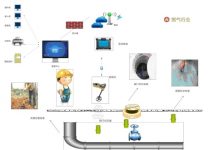
RFID Intelligent Management System Solution for Underground Railway Pipeline Detection and Underground Marking
[ad_1]
1. System background
Underground pipelines are an important part of the national economy (or city) infrastructure. Current status data of underground pipelines are important basic data for survey, design, planning, construction, and management. Due to historical reasons, the data on underground pipelines in many industries in our country are incomplete, incomplete, or inconsistent with the status quo. Problems often occur due to pipeline leakage, blind construction and damage to underground pipelines, resulting in water outages, power outages, gas outages, communication interruptions, and even disasters. , Causing negative social impact. In addition, the inability to relocate the deep and large pipelines causes major program changes for construction projects, which affects the construction period and brings greater economic losses. Therefore, during the line survey, design and construction, it is necessary to conduct comprehensive or key detection of the current status of the underground pipelines in the railway passing area and the planned development area, which is of great significance to the smooth progress of the design and construction. The objects of underground pipeline detection include various upper pipelines such as water supply, drainage, gas, heat, industry, etc. buried underground, as well as underground cables such as electricity, communication, and signals.
Based on the above problems, we can see that the current underground railway management needs: a practical and effective method of acceptance, a means of rapid identification and search, and a digital and intelligent information management system. The underground electronic identification management system can solve these problems.
Second, the system achieves its goals
1. Provide a non-excavation method to accurately locate, quickly find and identify railway pipelines, provide point-to-point investigations in times of crisis, and effectively improve the ability of emergency response to pipeline accidents.
2. The establishment of electronic archives of railway underground pipe networks will help scientific research and overall planning of urban underground pipe networks, and improve the level of urban infrastructure construction and management.
3. Create a new mode of pipe network management through non-excavation, visualization, real-time, integrity, and pipeline life cycle, which is conducive to improving the government’s supervision level of the public industry and the service level of the public service industry.
4. Through the analysis of the basic data and operation and maintenance data of the underground pipeline network, the operation of the underground pipeline network can be effectively grasped, potential safety hazards and operational problems can be discovered in time, pipeline accidents can be prevented, and a solid fortress can be built for the people’s property safety.
3. System structure
3.1 System composition

The system consists of four parts: buried electronic marker, marker detection equipment, handheld terminal and background management system.
3.2 Product introduction
3.2.1 Cantechs Underground Electronic Marker
The buried electronic marker is used to bury the pipeline underground and store the identity information of the pipeline. The electronic marker ID of the pipeline network is read by using the detection device, and the relevant attribute information of the relevant location is obtained from the database by obtaining the ID number.
Buried electronic tags

Functions and characteristics of electronic markers:
Globally unique ID code for easy identification
Can store data and record related information
Use low frequency signals to penetrate the road and have strong anti-interference ability
No power supply, completely maintenance-free
Identify pipelines on site and guide pipeline excavation
More than 30 years of service life
Buried depth of electronic marker:
Schematic diagram of buried depth of buried electronic tags

3.2.2 Cantechs detection equipment
Buried tag detection equipment

Can identify and read buried electronic markers
Can detect underground pipeline routing
Accurately locate and find underground facilities
The equipment is easy to operate, easy to carry and use
Long battery standby time
Can transmit the read related ID to the handheld terminal
3.2.3 Cantechs Handheld Terminal
Handheld Terminal

By detecting the ID number transmitted by the device, the attribute information and picture information of the relevant marker can be obtained, and at the same time, the target buried electronic marker can be navigated in real time.
Real-time navigation

Information display

3.2.4 Backstage management system
Connected to detection equipment, real-time data collection and file
Realize the whole-process inspection and management of underground pipeline network through detection equipment
With image display function, pipeline installation information and route direction can be displayed on the map
Personnel configuration and management can be carried out on the pipeline network inspection, combined with the actual situation of the enterprise, and strong personalization
Four, system function
1. Precise detection of pipelines
It can accurately locate the direction of the pipeline quickly and accurately, reducing the dependence on drawings and related reference objects. Compared with the traditional pipeline detector, it has strong anti-interference ability and simple operation.
2. Quickly locate and navigate the target location of the pipe section
The target position can be navigated in real time, no matter how the external reference object changes, the target position can be found quickly.
3. Trenchless understanding of underground pipeline information
You can quickly check the relevant underground attributes without excavation, including map low information, crossing interval, corner angle, crossing length, etc.
4. Scientific and effective recording and maintenance inspection information
The related maintenance and inspection records can be archived electronically to ensure that all historical events of the pipeline can be quickly grasped regardless of time changes or personnel turnover.
5. Provide data foundation for census and smart city construction
With the vigorous development of railway construction, more and more pipelines are vertically and horizontally underground. Therefore, not only a large system platform is needed to manage them, but also relevant basic data are needed to accurately describe them.
[ad_2]



